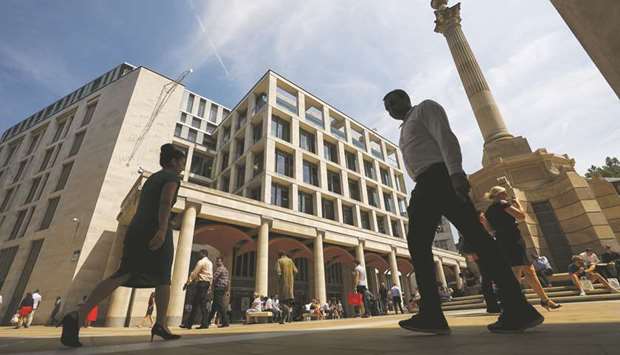British shares suffered and sterling tumbled yesterday as the growing risk of a disorderly divorce from the European Union spooked investors, with leading index the FTSE 100 moving for most of the day in rare lockstep with the domestic currency.
The FTSE 100 eventually ended broadly flat, reversing the session’s earlier 0.8% fall, which came even as sterling dived after high-profile resignations thrust Prime Minister Theresa May’s government into turmoil, just a day after she clinched a draft Brexit deal.
The FTSE 100, which makes 70% of its income overseas, is normally boosted by a weaker pound, but losses in companies more exposed to the domestic economy, such as banks and housebuilders, almost offset gains in the big exporters.
It ended up just 0.06%.
The more domestically-exposed FTSE 250 fell 1.3%, while the neighbouring Irish bourse fell 3.9%, its worst daily performance since the Brexit referendum more than two years ago.
According to a Reuters analysis of data, the FTSE 100 and sterling have moved in tandem so far this week, the first time since September 29, underscoring deepening worries about the fall-out across Britain’s financial markets and economy from the tumultuous negotiations for a Brexit deal.
The resignations of Brexit minister Dominic Raab and work and pensions minister Esther McVey in protest at May’s draft deal for leaving the European Union pushed sterling down as much as 1.9% against the dollar.
Shares in state-owned lender Royal Bank of Scotland sank 9.3%, suffering their worst one-day loss since the June 2016 post-Brexit vote selloff, as shareholders priced in a higher risk of a general election.
The Labour party has pledged in its manifesto to break up the lender.
The fall in its share price wiped 2.85bn off the bank’s market value.
Lloyds and Barclays fell 5 and 4.1% respectively, also knocked by the heightened political uncertainty.
HSBC, which has a big international presence, rose 2.1%.
Housebuilders Persimmon, Taylor Wimpey and Berkeley Group fell between 6 and 7% in their worst daily performance since the Brexit referendum.
Barratt also lost more than 7%.
The four stocks shed a combined market cap of £1.6bn.
Retailers were also hit, with Marks & Spencer down 4.8% and Next down 4.1%.
Royal Mail shares made a U-turn from their positive open, trading down 6.5% after first-half profit dropped about 25% as costs weighed.
Shares in contractor Capita sank 14% after the Financial Times reported it is in danger of losing a British public health service (NHS) contract after failing to send letters with cervical screening dates or test results.
A source later told Reuters that the contract, which it said is currently loss-making, was not being withdrawn.

Pedestrians walk past the London Stock Exchange Group offices. The FTSE 100 ended broadly flat yesterday, reversing the session’s earlier 0.8% fall.
